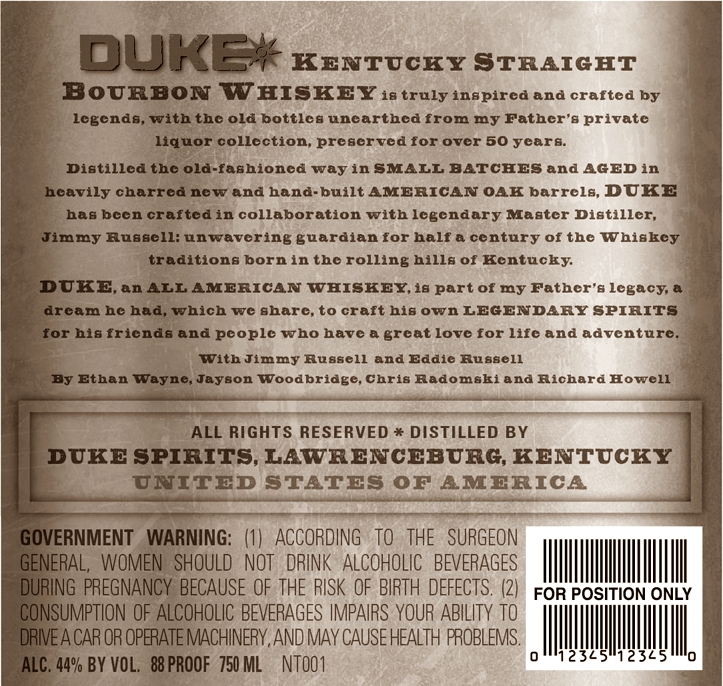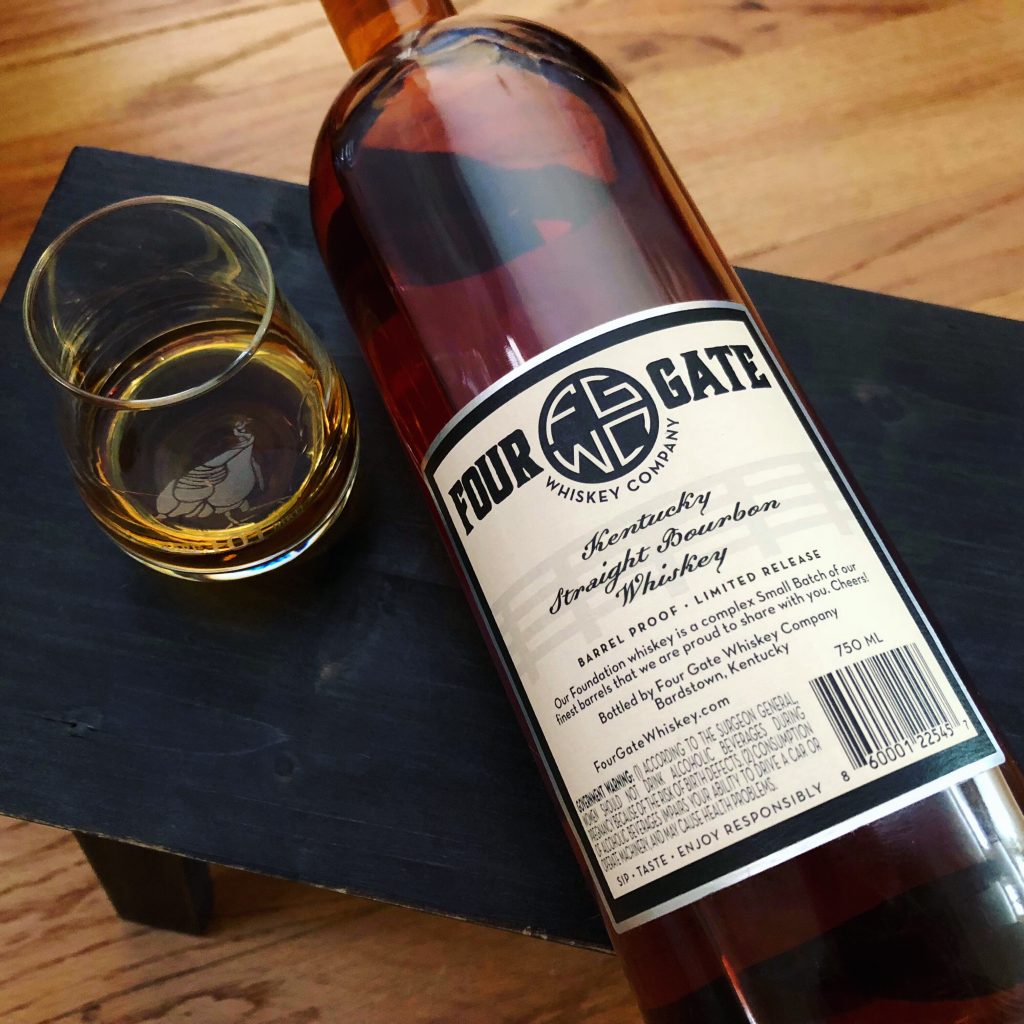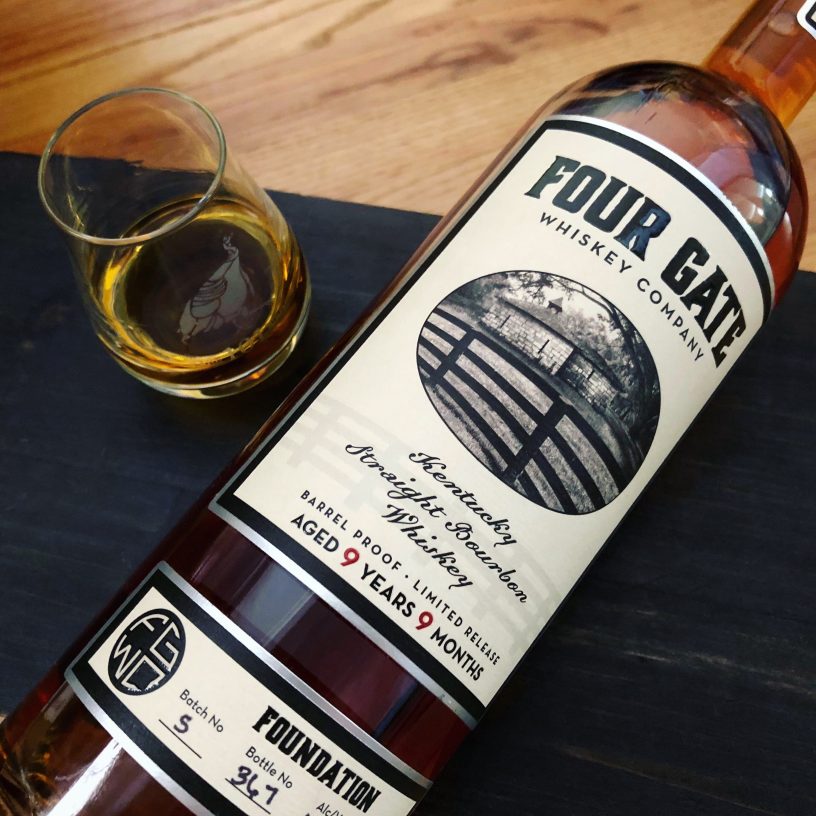Preface
Much of what I have to say today is based on rumor and speculation. I’m not an employee, representative, or affiliate of Wild Turkey or its parent company, Campari. I’m just a fan who likes to write. Sometimes I write too little; sometimes I write too much. File this one where you may.
Warning: This content is rated DTJ (don’t tell Jimmy).
Background
If I had a nickel each time I was asked about Four Gate Foundation over the past several weeks, I’d be typing this post from a sleek, new MacBook. Is Four Gate Foundation Wild Turkey bourbon? Yes … no … maybe so. But more on that later.
Let’s first address a myth. We’ve long been told that Wild Turkey doesn’t source whiskey to other producers (distillers or non-distiller producers). For the most, that’s true. You won’t find brokers with endless spreadsheets of Lawrenceburg’s finest bourbon. But that doesn’t mean Wild Turkey/Campari doesn’t sell barrels at wholesale. To be clear, I’m not talking about barrels bound for Kentucky Spirit or Russell’s Reserve Single Barrel, which are dumped and bottled on site. I’m talking about mature, untapped barrels leaving the distillery – barrels bound for an altogether different (largely mysterious) destination.
The word “sourced” has an ugly connotation in our hobby. Primarily because so many NDPs have been less than transparent – some blatantly dishonest – about the whiskey they sell in their fancy bottles with fancy stories (and even fancier premiums). There’s also a misunderstanding about what constitutes sourced whiskey. Sure, producers buying barrels in bulk from a broker are buying sourced whiskey. But what about contract distilling or independent bottling? Is that sourced whiskey? Technically, they’re not distilling it, so one could rightfully say it’s sourced whiskey.
Personally, I don’t consider whiskey that’s distilled by another producer under contract as sourced – especially if it’s distilled from a unique recipe and/or matured in a unique fashion (special cooperage, exclusive rickhouses, etc.). I just wish it were disclosed on the label. As for independent bottlers like J&J Spirits (formerly known as the Jewish Whisky Company), I don’t consider their products conventional sourced whiskey either. Independent bottling, particularly in the Scottish sense, shines a spotlight on the originating distiller. They visit distilleries, talk with the distillers, understand each distillery’s process, and select individual barrels deemed noteworthy for bottling. The whiskey is sold untouched (undiluted and non-chill filtered) and labeled with every detail one should wish to know (origin, location, maturity, ABV to the hundredth, etc.). There’s genuine appreciation and transparency, and those are never bad things.
What about Wild Turkey? Well, if you roll back the clock to the 1940s, Wild Turkey didn’t start as a distillery. Wild Turkey started as a brand – a brand fueled by sourced whiskey. In fact, roll back the clock a little further and you’ll find that most Kentucky distilleries weren’t in the retail business at all. They sold barrels at wholesale. There was no ugly “sourced” connotation attributed by consumers. Hell, most customers likely didn’t know or care. It was all about quality and brand loyalty. If a bourbon was labeled “distilled in Kentucky” (Maryland or Pennsylvania for rye) and carried their favorite brand name or logo, that was satisfactory. As such, Wild Turkey remained a Kentucky straight bourbon batched from various unconfirmed sources until 1971, when Austin-Nichols & Co. of Brooklyn, NY purchased what’s now the Wild Turkey Distillery in Lawrenceburg, KY.
Turkey; Not Turkey
For the record, Wild Turkey isn’t in the business of selling barrels wholesale. They maintain a healthy portfolio of straight whiskeys and liqueurs with more than enough demand to use the barrels they fill. But that doesn’t mean Wild Turkey doesn’t sell barrels to independent bottlers or other producers via contract (be it direct or through a broker).
For example, J&J Spirits has released seven Wild Turkey bourbons to date (two as Jewbilees and five under the Single Cask Nation label). The details of their arrangement remain private, and for good reason. Campari is in many ways entrusting the reputation of their whiskey to another party – fully disclosed under a non-Campari label. Owners Joshua Hatton and Jason Johnstone-Yellin have done an exemplary job balancing transparency and non-disclosure (not to mention selecting some incredible barrels). They’re second to none in my opinion, and I hope that J&J and Campari continue their relationship for many years to come.
And then there’s Duke.
Celebrity-affiliated American whiskey is commonplace now. Bob Dylan, Darius Rucker, Terry Bradshaw … the list goes on. But several years ago, outside of Frank Sinatra’s affinity for Jack Daniel’s and Willie Nelson’s Old Whiskey River, there were few (if any) celebrity affiliations of note. Well … there was Duke Spirits.
Who could forget John Wayne (1907-1979)? The legendary actor often known as “the Duke” dominated the silver screen for decades (still dominates Western-themed marathons and TV channels in 2020). He also dominated bottles of Wild Turkey, at least according to my research. The man was rarely without his favorite bourbon and was known to have cases of Wild Turkey shipped to movie sets to cover the duration of filming. Despite Wayne’s highly questionable social and political views, it appears the Duke had great taste in whiskey.
I’m not certain when Duke Spirits actually kicked off, though it’s associated with John Wayne Enterprises and the Duke’s son, Ethan Wayne. In 2014, John Wayne Enterprises filed suit against Duke University over the use of the name “Duke.” No, I’m not joking. Author and attorney Brian Haara covered the story that same year, and let me tell you, it’s quite an interesting read. Most interesting is the part about a crafty TTB label change, when Duke Spirits filed to remove the names “Jimmy Russell and Eddie Russell” from their bourbon’s reverse label. It kept “Distilled by Duke Spirits, Lawrenceburg, Kentucky,” even though Duke Spirits wasn’t registered to do business in the state. Fascinating.

So yes, Wild Turkey apparently has sourced whiskey to other producers. As for Duke Spirits, it’s now distilled by O. Z. Tyler in Owensboro, KY. But what happened to Duke’s Wild Turkey stocks? Did they bottle every remaining barrel or could there have been “leftovers” after the switch to O. Z. Tyler? I have no idea, but I find it a relative question considering that …
I Swear I Heard Gobbling in Bardstown
Last year I learned there was a certain distillery in Bardstown, KY that had stumbled upon some mature Wild Turkey barrels via a broker and used them for a particular “series.” The news came via an enthusiast’s public livestream and I was doubtful – doubtful until convinced by photographic evidence (not to mention a fully disclosed matching mash bill). Confirming the information really didn’t matter to me at the time. Once you start blending Wild Turkey bourbon with other whiskeys – well, I can do that at home. Still, it was a curious story.
Months went by and I don’t think many folks put two and two together (probably cared less than I did even if). The reviews came and went. Nary a mention of Wild Turkey. But then, seemingly out of the blue, another Bardstown operation, like it or not, found itself in the midst of similar Wild Turkey buzz.
Admittedly, I know very little about Four Gate Whiskey Company. Their website, while full of details regarding their products (several that are obviously not Wild Turkey), has minimal information about the company itself. I probably wouldn’t have noticed the brand had it not been for an influx of social media messages and tags: “Ever seen Foundation batch 3? Heard it’s Turkey.” “I know a guy who says this is Turkey. Are you going to review it?” “Hey Rare Bird – is this worth $200? It’s barrel-proof Turkey.” Etc., etc. My first inclination was to promote skepticism. $200 for any bourbon (even if Wild Turkey) is asking a lot – a whole lot. As such, I usually replied stating that Russell’s Reserve Single Barrel is bonafide Turkey, only $65, and not terribly far from barrel proof. But that didn’t stop the messages and tags.
And then the announcement of Four Gate Foundation batch 5 arrived. The reported bourbon mash bill matched Wild Turkey’s (as did batch 3’s). It was also conveniently available on Seelbach’s, which I’d purchased bottles from before.
Ah, what the hell. At this point, completely avoiding Four Gate’s rumored Turkey releases was arguably a disservice to readers. A disservice. Yeah, that’s the ticket! Here Seelbach’s, take my money.
Four Gate Foundation Batch 5
Well, you know what they say. The proof is in the pudding (or in this case the bottle). I suppose it’s past time to grab a Glencairn and give this one a thorough evaluation. (Spoiler: I didn’t want to love this one, especially considering the hefty price tag, but I do.)

Four Gate Whiskey Company Foundation batch 5 (2020) – 120.2-proof NCF KSBW (75% corn, 13% rye, 12% malted barley) – aged at least nine years, nine months – bottled by Four Gate Whiskey Co., Bardstown, KY – bottle #367 of 590
Tasted neat in a Glencairn after a few minutes rest …
Color: dense copper
Nose: (complex, modern WT) toasted caramel, blood orange, fragrant charred oak, herbal & floral spice, vanilla bean, brown sugar, maple syrup, sweet tobacco, baked apples, nutmeg, clove, leather
Taste: (immediate burst of fruity pepper) burnt caramel, creme brulee, Coca-Cola Classic, molasses, maple-coated oak, brown sugar, tobacco, antique leather, orange zest, hints of black cherry
Finish: medium long, layered & robust – caramel chews, herbal tea, licorice, spicy oak, vanilla, black pepper, sassafras, maple, cola, faint citrus & candy apple
Overall: Four Gate Foundation batch 5 definitely tastes like barrel-proof Wild Turkey. Damn fine barrel-proof Wild Turkey at that. Sure, there’s obvious similarities to Russell’s Reserve Single Barrel Bourbon. To say they’re of the same character, however, is like saying Wild Turkey 101 is the same as Longbranch. Foundation 5’s nose is about the closest you’ll get to Russell’s performance wise, but as you take that first sip … well, it’s the same highway, but you’re cruising it in a ‘67 Shelby GT500. It finishes as it should, with considerable depth through layers of chewy caramel and complex baking spice. I’ve had longer finishes, but duration isn’t the end all, be all, mark of quality. In fact, I’d say Foundation 5’s strength lies in its timing and balance, as its notes develop with well-paced phrasing from phase to phase. The overall delivery is flawless – so much so, you’ll forget you’re sipping 120-proof whiskey.
Rating: n/a
So it’s Wild Turkey then, right? Officially, no. There’s been no confirmation from Four Gate Whiskey Co. (no denial either). As for Campari, to my knowledge they have absolutely nothing to do with this release (nor Foundation batch 3). Unofficially, I’ll say that it very likely – almost certainly – is Wild Turkey bourbon.
Four Gate was wise to purchase these barrels – even wiser to release them batched at full barrel strength (NCF). They could’ve batched them with younger whiskey or finished the lot in various ex-wine or ex-spirit casks – but they didn’t. While I applaud producers that experiment, sometimes it’s best to just leave top-quality bourbon as is. As Jimmy Russell might say, don’t monkey with it. Kudos to the folks at Four Gate for realizing what they had while they had it.
But hold on. I do have one gripe … price.
I’m not sure where or how Four Gate Whiskey Co. derived their retail price for Foundation. Chances are they referenced brands like Kentucky Owl, Cream of Kentucky, and Old Carter. Or, maybe Master’s Keep Cornerstone and Russell’s Reserve 2002 helped to establish valuation? It’s hard to say. We also don’t know the net expense of the barrels Four Gate purchased. Presuming Wild Turkey as the source, and knowing their rarity on the wholesale market, $200 a bottle might not be as exorbitant as it seems.
Ultimately, I love Foundation batch 5 but it’s hard to justify half a case of Russell’s Reserve Single Barrel private selections (or even four bottles of Rare Breed). But then, one could always point to the prices enthusiasts pay for “Donut” (Kentucky Legend) and Single Cask Nation Wild Turkey bottles on secondary markets. Taking those into consideration, $200 doesn’t seem as crazy. Still crazy, but anyway.
If you have $200 to splurge on a single luxury bottle and you absolutely love Wild Turkey, Foundation batch 5 (or possibly batch 3) is a worthy purchase. I’m somewhat ashamed to admit it, but I carry no guilt in my investment. Not only did I purchase Foundation batch 5 from Seelbach’s (now sold out), I purchased batch 3 from Justins’ House of Bourbon to open and share at my annual Patreon gathering in April. So if you’re looking to buy Four Gate Foundation, I’d recommend giving Justins’ House of Bourbon a call. Last I heard they had a few bottles left at suggested retail price.
Conclusion
If there’s a takeaway today it’s this: Campari must realize that Wild Turkey is falling behind the times in comparison to its competition. I’m not talking about sourcing whiskey. Personally, I’d prefer Wild Turkey keep its barrels exclusive to its own brands. I’m talking about the need for mature, barrel-proof Wild Turkey bourbon and rye whiskey.
Buffalo Trace has Stagg Jr. (about 10 years), Heaven Hill has Elijah Craig Barrel Proof (12 years), Barrell Bourbon frequently has mature (10-year-plus) batch-proof releases – which reminds me – there’s a virtual sea of 13-year George Dickel barrels bottled at barrel strength by various NDPs. Yes, I realize Wild Turkey has Rare Breed. Please don’t get me wrong. Rare Breed is excellent for the money. It just doesn’t compare to Four Gate Foundation in profile. It just doesn’t.
Those familiar with this blog know I’ve advocated for barrel-proof, single-barrel Wild Turkey private selections for years. While that’s something that needs to happen ASAP, especially if the brand wants to stand toe-to-toe with other producer’s single-barrel programs, it’s not exactly what I’m pushing for in this post.
Which brings me to the two things I’ve taken from this adventure with Four Gate Foundation:
- The best bourbon in Bardstown comes from Lawrenceburg.
- We need Russell’s Reserve 10-year Batch Proof.
And I think that damn near sums it up.
Enjoy this blog? Please consider supporting it via Patreon. In return you’ll receive access to exclusive rewards and weekly whiskey content. Thank you! dj



So you haven’t tasted the 3 yet, eh? You’re killin’ me here!
Saving it for my patrons! 🙂
I’ve personally never felt like I was missing out on something not having a barrel proof offering under the RR label, as the proof of RR Sib is perfect for me, but I definitely understand why that would help drive more enthusiasm for the brand. An age stated 10 year barrel proof offering under the RR label would sell like hot cakes I imagine. I actually kinda like the idea of it being batched as well. No doubt single barrels keep things interesting, but I like the consistency of a batched product too.
Right. After having this Foundation, which is actually mostly 11-year, a batched BP RR10 could be incredible.
1 barrel of 9Y9M in Batch 3 is what I hear, most of the rest being 11+.
Four Gate Whiskey Co. was on the Bourbon Lens podcast and shared similar info. Sounds right to me!
A RR10 Batch Proof sounds sooooo damn good.
PLEASE!
I know, right?!
Seems Seelbach is sold out, anyone have suggestions of where to look?
Check with Justins’ House of Bourbon.
Corkdorks in midtown Nashville had batch 3 a few weeks ago when I was in town. I’m so glad that I picked up a bottle because it is DELICIOUS!!!
Hope to try batch 3 soon. Glad you found one!